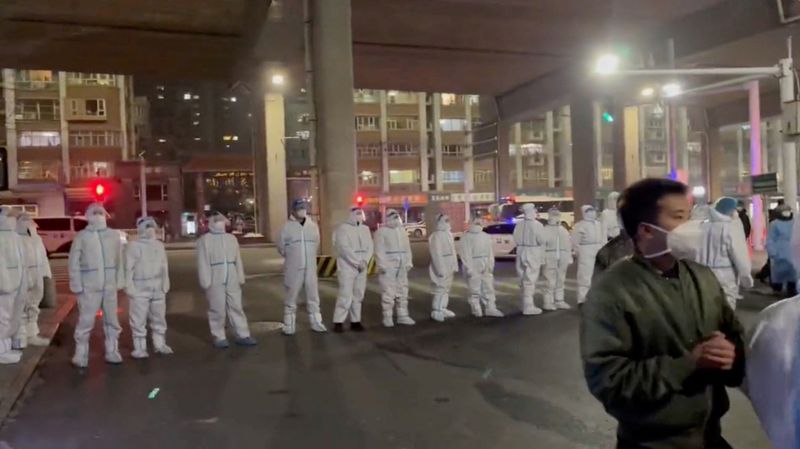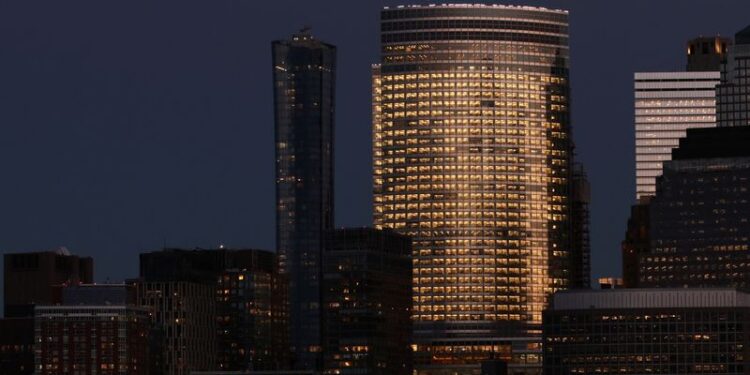
© Reuters. FILE PHOTO: Protests against measures for the coronavirus disease (COVID-19) outbreak in the city of Urumqi, Xinjiang, Uygur, China in a screenshot obtained from video released November 25, 2022. Video obtained by Reuters/via Reuters
2/5
By Martin Quinn Pollard
BEIJING (Reuters) – More Chinese cities, including the far western Urumqi, announced an easing of coronavirus restrictions on Sunday, as China tries to make its anti-coronavirus policy more targeted and less onerous after anti-government protests. Normal against restrictions last weekend.
Urumqi, the capital of the Xinjiang region where protests first erupted, will reopen shopping malls, markets, restaurants and other venues from Monday, authorities said, after months of strict lockdowns.
There were few signs of major unrest this weekend, despite a heavy police presence in Beijing’s Liangmaqiao district and in Shanghai around Wulumuqi Road, named after Urumqi. The two sites witnessed protests a week ago.
A deadly apartment fire last month in Urumqi sparked dozens of protests against COVID restrictions in more than 20 cities, a show of civil disobedience unprecedented in mainland China since President Xi Jinping came to power in 2012.
In recent days, many cities have announced easing of lockdowns, testing requirements and quarantine rules.
People familiar with the matter told Reuters last week that China is set to further announce easing nationwide testing requirements as well as allowing positive cases and close contacts to isolate at home under certain circumstances.
Deputy Prime Minister Sun Chunlan, who oversees the coronavirus effort, said last week that the virus’s ability to cause disease was weakening — a change in messaging that aligns with what health authorities around the world have said for more than a year.
local changes
Mitigation measures varied across the country.
On Sunday, Nanning, the capital of the southern province of Guangxi, removed the requirement to have a negative COVID test within 72 hours to ride the subway.
Local authorities said Saturday in Beijing that the purchase of fever, cough and sore throat medicine no longer requires real-name registration. It followed local announcements in recent days in the capital that those who test positive for the virus can self-quarantine at home.
In Beijing and Wuhan, people expressed frustration over the weekend that recent negative tests were still required to enter a number of venues, despite the mass closing of COVID-testing booths, causing long lines at the few that were still open.
“Are they stupid or just mean?” A Weibo user (NASDAQ:) posted on Sunday. “We shouldn’t close the COVID testing stations until we have passed the COVID test.”
Authorities said Sunday that numbers of new daily cases fell nationwide to 31,824, which may be partly due to fewer people being tested due to the easing of restrictions. On Sunday, China reported two new deaths from the virus.
Universal outlet
Xi’s non-coronavirus policy has made China a global anomaly nearly three years into the epidemic, which began in the central Chinese city of Wuhan. In addition to fueling growing frustration, this policy has had a devastating impact on the world’s second largest economy and disrupted global supply chains.
China argues that the policy, which has closed its borders entirely except for travel, is necessary to save lives and prevent its healthcare system from becoming overwhelmed.
Despite the recent easing, many experts said China is unlikely to begin a major reopening before March at the earliest, given the need to ramp up vaccinations, especially among its aging population.
“While there have been quite a few domestic changes to COVID policies recently, we do not interpret them as China abandoning the Zero COVID Policy (ZCP) yet,” Goldman Sachs (NYSE:) said in a note on Sunday.
“Instead, we see it as clear evidence of the Chinese government’s willingness to go out, and try to reduce the economic and social cost of controlling COVID in the meantime. Preparations could last a few months and there are likely to be challenges along the way.”
Estimates of the number of deaths China could see if it were to achieve a full reopening have ranged from 1.3 million to more than 2 million, although some researchers have said the number of deaths could drop sharply if there is a focus on vaccination.
Earlier this week, China announced that it would speed up COVID-19 vaccinations for the elderly, but many are still reluctant to get vaccinated. “Some people have doubts about the safety and efficacy of the country’s novel coronavirus vaccine, believing that vaccinating the elderly may be dangerous,” said an article in the ruling Communist Party’s official People’s Daily on Sunday.
“Experts say this perception is wrong,” the article added, before asserting that home-made vaccines are “safe.”
US Director of National Intelligence Avril Haines said Saturday that foreign COVID vaccines are not approved in China and that Xi is unwilling to change that.

























